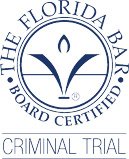Criminal Defense Frequently Asked Questions
If you have been accused of a crime, you need a knowledgeable legal advocate to represent your interests, help you to deal with law enforcement and help you decide how to proceed with your case. At Stechschulte Nell, our Tampa criminal defense lawyers have a track record of success defending DUI, state, and federal cases.
As a former prosecutor and a board-certified criminal trial law attorney who has represented many clients in motions to dismiss, criminal jury trials and a variety of criminal actions, Ben Stechschulte understands that the criminal justice system can be confusing and that it is easy to become overwhelmed with questions after an arrest. To help you to better understand your rights and options, our top-rated Tampa criminal defense lawyer has prepared these frequently asked questions and answers.
Can I get out on bail if I am charged with a crime?
If you are charged with a crime, you typically can be released on bail pending the trial except for very serious criminal offenses. The amount of your bail will depend upon the discretion of the judge, the seriousness of your offense and whether you are considered to be a flight risk.
What is the difference between a felony and a misdemeanor?
Misdemeanor charges are usually less serious charges that result in a year or less of jail time. Felonies are more serious crimes that can carry longer terms of incarceration. In some cases, whether a crime is a misdemeanor or a felony will depend upon the specifics of the circumstance.
For example, possession of small amounts of marijuana is a misdemeanor but possession of large amounts of marijuana is a felony.
Can I get my charges dismissed?
If there is not sufficient evidence against you to proceed to trial, it is possible to have criminal charges against you dismissed before your case goes to court by contacting the prosecutor and presenting evidence on your behalf. Tampa criminal defense attorney Ben Stechschulte has argued more than 200 motions to dismiss.
Can I keep evidence out of court?
If law enforcement collected evidence in violation of your constitutional rights, such as searching without a warrant or without reasonable cause or arresting you without reading you your Miranda rights, you may be able to have such illegally collected evidence suppressed (kept out of court).
Should I plead guilty?
In some cases, if you plead guilty to the crime you have been accused of, you can receive a reduced sentence. A criminal defense attorney in Tampa will help you assess your case and decide if pleading guilty is the right choice for you.
Can I defend myself against criminal accusations?
You can raise a number of possible defenses when you are accused of a crime. The appropriate defense will depend on the nature of the crime and the circumstances surrounding your case. Remember, the prosecutor has the burden of proving that you are guilty beyond a reasonable doubt. You do not have to conclusively prove you were innocent in order to avoid criminal conviction.
Do I Need a Lawyer?
There are many procedural and technical requirements associated with defending yourself against criminal charges and you have a lot at stake. It is always important to retain a lawyer when you are accused of any crime so you can have the best chance of achieving the most favorable possible outcome.
Call A Top-Rated Defense Attorney
You may be facing significant penalties including fines/fees, losing your job and/or professional licenses, and jail time. To learn more about how a criminal defense lawyer can help you when you are facing criminal charges, contact Stechschulte Nell South Tampa law firm today.














